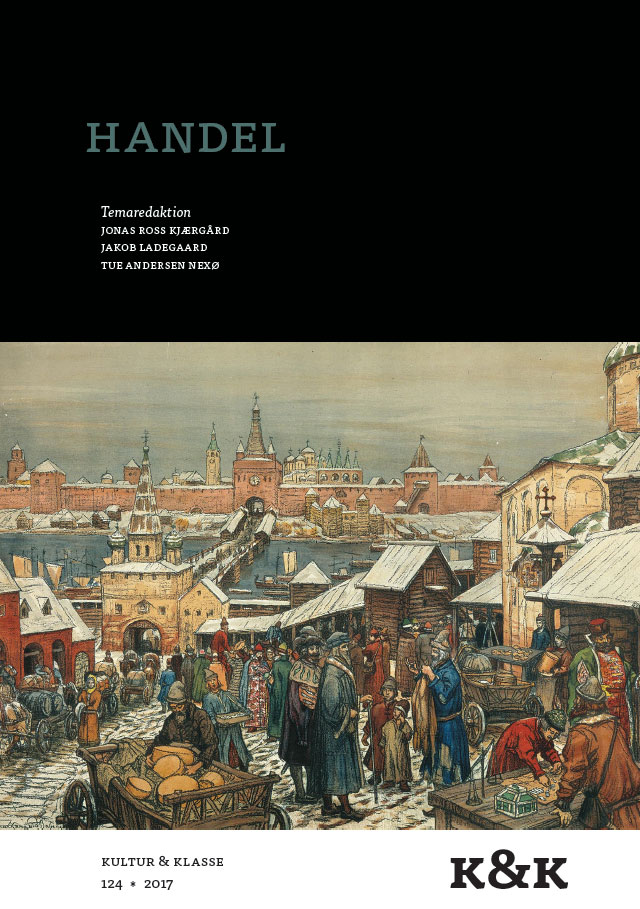Købmandskab i tyrker-frygtens tid
DOI:
https://doi.org/10.7146/kok.v45i124.103644Nøgleord:
Tyrker-frygt, handelsrelationer, Hans Rosenplüt, FortunatusResumé
Attempts from the side of the Holy See to undercut commercial relations with the Near Orient were never particularly successful, not even after the Fall of Constantinople when fear of the Turks was on the rise. Two German literary works from the following half century demonstrate how the viewpoint of the merchants is articulated within a horizon of experience that is far from religious or geo-political concerns. In Rosenplüt’s carnival play Des Türken Fastnachtspiel the Turkish Sultan is depicted as representing an idealized state (not least when it comes to the conditions of commerce) contrasting the multifarious deficiencies of the Holy Roman Empire; in the anonymous novel Fortunatus the conditions and institutions of commercial relations are foregrounded, exemplified by Alexandria and with a focus on the rational logic of commerce.
Referencer
Abulafia, David. The Great Sea. A Human History of the Mediterranean. London: Allen Lane, 2011. Ackermann, Christiane. ”Dimensionen der Medialität. Die Osmannen im Rosenplütschen ‘Turken Vasnachtspil’ sowie in den Dramen des Hans Sachs und Jakob Ayer”. Fastnachtspiele. Weltliches Schauspiel in literarischen und kulturellen Kontexten. Red. Klaus Ridder. Tübingen: Max Niemeyer Verlag, 2009. 189-220. Bernhard von Breydenbach. Die Reise ins Heiligen Land, Übertragung und Nachwort von Elisabeth Geck. Wiesbaden: Guido Pressler 1961. Carr, Mike. Merchant Crusaders in the Aegean, 1291-1352. Woodbridge: Boydell & Brewer, 2015. Classen, Albrecht. East meets West in the Middle Ages and Early Modern Times. Berlin/Boston: De Gruyter, 2013. Constable, Olivia Remie. Housing the Stranger in the Mediterranean World. Lodging, Trade, and Travel in Late Antiquity and the Middle Ages. Cambridge: Cambridge University Press, 2003. Dursteler, Eric R. ”On Bazaars and Battlefields: Recent Scholarship on Mediterranean Cultural Contacts”. Journal of Early Modern History 15 (2011): 413-434. Ehrstine, Glenn. ”Aufführungsort als Kommunikationsraum. Ein Vergleich der fastnächtlichen Spieltradition Nürnbergs, Lübecks und der Schweiz”. Fastnachtspiele. Weltliches Schauspiel in literarischen und kulturellen Kontexten. Red. Klaus Ridder. Tübingen: Max Niemeyer Verlag, 2009. 83-97. Ehrstine, Glenn. ”Fastnachtsrhetorik: Adelskritik und Alterität in Des Turken Vasnachtspil”. WerkstattGeschichte 37 (2004): 7-23. Flenley, Ralph. ”London and Foreign Merchants in the Reign of Henry VI”. The English Historical Review 25 100 (Oct. 1910): 644-655. Glier, Ingeborg. ”Rosenplütsche Fastnachspiele”. Kurt Ruh u.a. (Hg.): Die deutsche Literatur des Mittelalters, Verfasserlexikon, Bd. 8: Spalte 195-231. Berlin/Boston: De Gruyter, 2. Aufl., 1992. Höfer, Almut. ”Ist das Böse schmutzig? Das Osmanische Reich in den Augen europäischer Reisender des 15. und 16.Jahrhunderts”. Historische Anthropologie 11 (2003): 176-192. Kaufmann, Thomas. 'Türckenbüchlein’: Zur christlichen Wahrnehmung 'türkischer Religion’ in Spätmittelalter und Reformation. Göttingen: Vandenhoeck & Ruprecht, 2008. Keller, Adalbert von. (Hg.): Fastnachtspiele aus dem fünfzehnten Jahrhundert, bind 1 Stuttgart: Bibliothek des litterarischen Vereins in Stuttgart, 1853. Kulischer, Josef. Allgemeine Wirtschaftsgeschichte des Mittelalters und der Neuzeit, Band I Das Mittelalter. München/Berlin: R. Oldenbourg, 1928. Lavenia, Vincenzo. ”Non barbari, ma religiosi e soldati. Machiavelli, Giovio e la turcofilia in alcuni testi”. Storia del pensiero politico 1 (2014): 31-58. Malcolm, Noel. ”Positive Views of Islam and of Ottoman Rule in the Sixteenth Century: The Case of Jean Bodin”. The Renaissance and the Ottoman World. Red. Contadini, Anna og Claire Norton. England: Ashgate Publishing Limited, 2013. 197-217. Melville-Jones, J.R. (ed. & transl.). The Siege of Constantinople 1453: Seven Contemporary Accounts, Amsterdam: Hakkert, 1972. Menache, Sophia. "Papal Attempts at a Commercial Boycott of the Muslims in the Crusader Period”. Journal of Ecclesiastical History vol. 63 nr. 02 (2012): 236-259. Paulli, R. (udg.). Danske Folkebøger bind X: Fortunatus, 1927. Pertusi, Agostino (ed.). La caduta di Costantinopoli. Tomo II. L’Eco nel mondo. Milan: Mondadori, 2007 (1976). Philippides, Marios. ”The Fall of Constantinople 1453: Bishop Leonardo Guistiniani and his Italian Followers”. Viator, vol 29 (1998): 189-226. Poumarède, Géraud. Pour en finir avec la Croisade. Mythes et réalités de la lutte contre les Turcs au XVIe et XVIIe siècles. France: Presses Universitaires de France, 2009. Prager, Debra. ”Fortunatus: ”Auss dem künigreich Cipern” Mapping the World and the Self”. Daphnis 33 (2004): 123-158. Stuplich, Birgitte. ”Das ist dem adel ain grosse schant. Zu Rosenplüts politischen Fastnachtspiele”. Röllwagenbüchlein. Festschrift für Walter Röll. Red. Jaehrling, Jürgen, Uwe Meves og Erika Timm. Tübingen: Max Niemeyer Verlag, 2002. 165-185. Richard, Jean. “Traité d'Emmanuel Piloti sur le passage en Terre sainte (1420)” in Bibliothèque de l’école des chartes, 1958, tome 116: 259-261. Roloff, Hans-Gert (ed). Fortunatus. Studienausgabe nach der editio Princeps von 1509. Stuttgart: Reclam, 1996. Roth, Detlef. ”Negativeksempel oder Sinnverweigerung? Zu neueren Deutungsversuchen des ’Fortunatus’-Roman”. Zeitschrift für deutsches Altertum und deutsche Literatur Band 136, Heft 2 (2007): 203-230. Walsh, Martin W. "Conquering Turk in Carnival Nürnberg: Hans Rosenplüts 'Des Turken Vasnachtspil' of 1456”. Fifteenth Century Studies 36 (2011): 181-200. White, Leslie A. ”Early Development of Capitalist Culture: Tenth to Sixteenth Centuries”. Modern Capitalist Culture. Red. White, Leslia A. New York: Routledge, 2008. 31-55. Wilhelm, Eva-Maria. Italianismen des Handels im Deutschen und Französischen. Berlin/Boston: De Gruyter, 2013. Wis, Majatta. ”Zum deutschen 'Fortunatus': Die mittelalterliche Pilger als Erweiter des Weltbildes”. Neuphilologische Mittellungen 63 (1962): 5-55.
Downloads
Publiceret
Citation/Eksport
Nummer
Sektion
Licens
Tidsskriftet følger dansk ophavsret.





